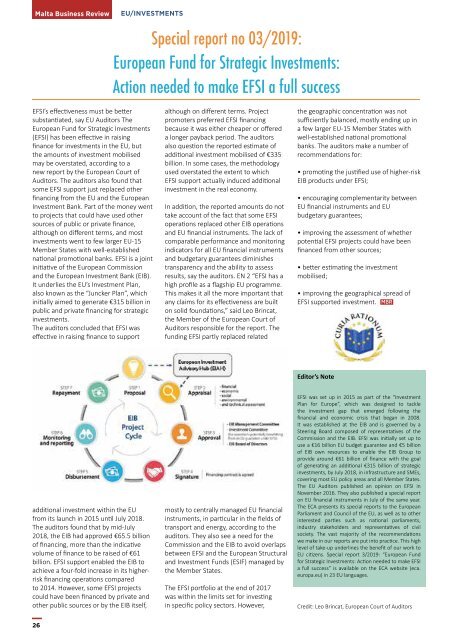MBR_ISSUE 48_FEB_LR
Create successful ePaper yourself
Turn your PDF publications into a flip-book with our unique Google optimized e-Paper software.
Malta Business Review<br />
EU/INVESTMENTS<br />
Special report no 03/2019:<br />
European Fund for Strategic Investments:<br />
Action needed to make EFSI a full success<br />
EFSI’s effectiveness must be better<br />
substantiated, say EU Auditors The<br />
European Fund for Strategic Investments<br />
(EFSI) has been effective in raising<br />
finance for investments in the EU, but<br />
the amounts of investment mobilised<br />
may be overstated, according to a<br />
new report by the European Court of<br />
Auditors. The auditors also found that<br />
some EFSI support just replaced other<br />
financing from the EU and the European<br />
Investment Bank. Part of the money went<br />
to projects that could have used other<br />
sources of public or private finance,<br />
although on different terms, and most<br />
investments went to few larger EU-15<br />
Member States with well-established<br />
national promotional banks. EFSI is a joint<br />
initiative of the European Commission<br />
and the European Investment Bank (EIB).<br />
It underlies the EU’s Investment Plan,<br />
also known as the “Juncker Plan”, which<br />
initially aimed to generate €315 billion in<br />
public and private financing for strategic<br />
investments.<br />
The auditors concluded that EFSI was<br />
effective in raising finance to support<br />
although on different terms. Project<br />
promoters preferred EFSI financing<br />
because it was either cheaper or offered<br />
a longer payback period. The auditors<br />
also question the reported estimate of<br />
additional investment mobilised of €335<br />
billion. In some cases, the methodology<br />
used overstated the extent to which<br />
EFSI support actually induced additional<br />
investment in the real economy.<br />
In addition, the reported amounts do not<br />
take account of the fact that some EFSI<br />
operations replaced other EIB operations<br />
and EU financial instruments. The lack of<br />
comparable performance and monitoring<br />
indicators for all EU financial instruments<br />
and budgetary guarantees diminishes<br />
transparency and the ability to assess<br />
results, say the auditors. EN 2 “EFSI has a<br />
high profile as a flagship EU programme.<br />
This makes it all the more important that<br />
any claims for its effectiveness are built<br />
on solid foundations,” said Leo Brincat,<br />
the Member of the European Court of<br />
Auditors responsible for the report. The<br />
funding EFSI partly replaced related<br />
the geographic concentration was not<br />
sufficiently balanced, mostly ending up in<br />
a few larger EU-15 Member States with<br />
well-established national promotional<br />
banks. The auditors make a number of<br />
recommendations for:<br />
• promoting the justified use of higher-risk<br />
EIB products under EFSI;<br />
• encouraging complementarity between<br />
EU financial instruments and EU<br />
budgetary guarantees;<br />
• improving the assessment of whether<br />
potential EFSI projects could have been<br />
financed from other sources;<br />
• better estimating the investment<br />
mobilised;<br />
• improving the geographical spread of<br />
EFSI supported investment. <strong>MBR</strong><br />
Editor’s Note<br />
additional investment within the EU<br />
from its launch in 2015 until July 2018.<br />
The auditors found that by mid-July<br />
2018, the EIB had approved €65.5 billion<br />
of financing, more than the indicative<br />
volume of finance to be raised of €61<br />
billion. EFSI support enabled the EIB to<br />
achieve a four-fold increase in its higherrisk<br />
financing operations compared<br />
to 2014. However, some EFSI projects<br />
could have been financed by private and<br />
other public sources or by the EIB itself,<br />
mostly to centrally managed EU financial<br />
instruments, in particular in the fields of<br />
transport and energy, according to the<br />
auditors. They also see a need for the<br />
Commission and the EIB to avoid overlaps<br />
between EFSI and the European Structural<br />
and Investment Funds (ESIF) managed by<br />
the Member States.<br />
The EFSI portfolio at the end of 2017<br />
was within the limits set for investing<br />
in specific policy sectors. However,<br />
EFSI was set up in 2015 as part of the “Investment<br />
Plan for Europe”, which was designed to tackle<br />
the investment gap that emerged following the<br />
financial and economic crisis that began in 2008.<br />
It was established at the EIB and is governed by a<br />
Steering Board composed of representatives of the<br />
Commission and the EIB. EFSI was initially set up to<br />
use a €16 billion EU budget guarantee and €5 billion<br />
of EIB own resources to enable the EIB Group to<br />
provide around €61 billion of finance with the goal<br />
of generating an additional €315 billion of strategic<br />
investments, by July 2018, in infrastructure and SMEs,<br />
covering most EU policy areas and all Member States.<br />
The EU Auditors published an opinion on EFSI in<br />
November 2016. They also published a special report<br />
on EU financial instruments in July of the same year.<br />
The ECA presents its special reports to the European<br />
Parliament and Council of the EU, as well as to other<br />
interested parties such as national parliaments,<br />
industry stakeholders and representatives of civil<br />
society. The vast majority of the recommendations<br />
we make in our reports are put into practice. This high<br />
level of take-up underlines the benefit of our work to<br />
EU citizens. Special report 3/2019: “European Fund<br />
for Strategic Investments: Action needed to make EFSI<br />
a full success” is available on the ECA website (eca.<br />
europa.eu) in 23 EU languages.<br />
Credit: Leo Brincat, European Court of Auditors<br />
26
















